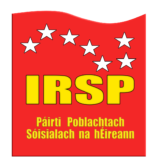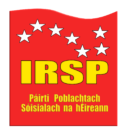
Friends and Comrades,
It is an honour and a privilege to be asked to speak at the IRSP’s Easter Commemoration this year. These types of words are spoken at the beginning of most of these events and sometimes they can be overused and thus lose their significance.
But comrades, when I hear stories about the actions and the bravery of those who we gather to remember I can only stand in awe of their immense sacrifice. So for me, it truly is an honour to be asked to speak here today to remember people like Seamus Costello and all those brave volunteers and political activists who came before and after them. And it is a privilege to represent the movement to which they gave their allegiance, the Irish Republican Socialist Movement.
And not only do we remember those brave men and women of this movement but we also remember those who took up arms in 1916 in a bid to overthrow the British establishment in Ireland. When the Proclamation of the Irish Republic was read from the steps of the GPO Connolly knew that the British would not accept any challenge to their rule. He knew that he and the others who signed that proclamation would be executed if the rising failed and that is indeed what happened. But it didn’t deter them. Their belief in the right of the Irish people to determine their own future was absolute and unshakable and the events of Easter week 1916 started a chain of events that led to 26 counties of this nation gaining independence. Sadly the six northern counties are still under British control and recent agreements and deals have utterly failed to address this issue other than to copper fasten the status quo.
Just as today there were differences about what an Irish Republic would look like in terms of the political direction of an independent nation. James Connolly stood against all forms of oppression and advocated the establishment of a Socialist Republic. He saw no difference between the struggle for freedom from Britain and the struggle against capitalist oppression and for the emancipation of the Irish Working class. He argued for the establishment of a workers republic in which the working class would have control over the means of production, distribution and exchange. This is a fundamental Marxist position which remains a central tenet of the IRSP position today and not all republican groups accept this position which stands the Republican Socialist Movement apart in terms of our fundamental political thinking.
Looking backward over the past 100 years we can see a clear and definite lineage. We can trace the organic beginnings of the Republican Socialist Movement and of the great political traditions of revolutionary socialism and republicanism stretching back to the Irish Socialist Republican Party and the Irish Citizen Army and beyond.
The IRSP stand by our founding principles which were gathered from the insightful writings of James Connolly. One quotation attributed to him is as follows, “We believe in constitutional action in normal times; we believe in revolutionary action in exceptional times.” This one line quote from Connolly can be applied directly to the IRSM today. He wrote this during the Dublin Lock-out when the Irish Citizen Army emerged. When looking back to 1913 we can see the political roots of our present organisation. Let us be quite clear, these are not normal times, the continued partition of Ireland, continued political policing, the degradation and humiliation of republican prisoners, the human rights abuses directed at republicans from those that administer so called justice from both North and South, allied to that the effects of the greed of capitalists and their austerity attacks on our class, no comrades these are not normal times.
It was during the lock-out that James Connolly, Jim Larkin and Jack White formed the ICA. At the time the police in Dublin were being used by the bosses to break up demonstrations. In some cases they actually killed striking workers, James Nolan and John Byrne were beaten and killed by police and a young girl, Alice Brady, was shot dead by a scab worker with a weapon given to him by his boss. The ICA was formed to protect workers from these brutal police attacks and this was the first instance in Europe of workers organising themselves in such a way. The one hundredth anniversary of these events is upon us and we’d like to use this opportunity to pay tribute to those with that vision and foresight and who agitated and organised in Dublin, in Belfast and around the country a century ago.
Comrades the work begun then has not been completed. It is all fine and well looking back with pride and paying tribute to those men and women of 1913 and 1916 but it means absolutely nothing if we cannot learn the lessons and adapt them to suit our present. Capitalism still runs deep, exploitation is rife, workers are being punished for the excesses and greed of the rich whilst workers remain largely unmotivated and without strong leadership. Sadly today’s workers do not have visionaries of the calibre of James Connolly and Jim Larkin to lead them but this should not deter revolutionary organisations such as the Republican Socialist Movement from organising and building towards our ultimate goal.
When the volunteers went out and took up positions on Easter week 1916 they too knew that they were fighting the might of the British Empire. Today we gather to remember and salute the memory of our comrades who made the ultimate sacrifice in pursuit of a 32 County democratic Irish republic. An Irish Republic based on the finest principles of socialism – freedom, equality and fraternity.
We remember with pride those volunteers of the Irish National Liberation Army and their comrades in the Irish Republican Socialist Party who lie buried in this plot and in plots across Ireland. Without their courage, bravery and integrity the ideas of republican socialism would have long ago been consigned to history, but I am proud to say we are still here taking their sacrifice as inspiration and building the movement to which they gave their lives.
From this platform we also send fraternal greetings to all imprisoned Irish republican activists, to our comrades in Portlaois Gaol, to the republican prisoners in Maghaberry, to Michael Campbell who is being held in atrocious and inhumane conditions in Lithuania we send our comradeship and solidarity. Especially in our thoughts is Marian Price, the victim of a vindictive British state, and we once again call for her immediate release, nothing else is acceptable. The case of Marions and that of Martin Corry to name only a few are reminders of what passes of as justice under the Stormont administration, oppression and human rights abuses have not gone away.
During Easter we commemorate not only the sacrifice of the men and women who took part in the Rising of 1916, but it is also the time when we analyse the current state of the Irish republican struggle. We also use this time to review how we in the Irish Republican Socialist Movement continue to prosecute revolutionary struggle in Ireland. We must analyse, learn and adapt to prevailing conditions. The IRSP and INLA have done this at every turn. This movement has shown courage in the decisions it has taken and it has led from the front on whatever field of battle we have chosen to fight. The primacy of politics as envisaged by our fallen comrade Ta Power is what drives the entire Republican Socialist Movement.
Comrades, it is vital that we plan and strategise for the future, and meet head on any challenges that confront us. Seamus Costello set out his plans for a socialist republic, his vision of a revolutionary working class political party, the Irish Republican Socialist Party. We are the genuine inheritors of the mantle of Connolly, Mellows and Costello and whilst we are humble as we don the mantle that has been handed down to us we take on the responsibility with determination, resolute that the IRSP will continue to develop our politics and strategies that can lead us to victory.
The IRSP have studied the past and learned from it. We’ve re-organized and are building. We are building a formidable political organisation that is led entirely by the ideals of the men and women who we today gather to remember.
As we approach the hundredth anniversary of the 1916 rising it is important that we recognize the vision and commitment of its leaders, it is important that we remember all those brave Irish Republicans who have lost their lives in struggle for an Irish Socialist republic in the intervening years. It is our solemn pledge to their memory and vision to pursue our aims with the same commitment and determination.
The Irish working class today, just as it was in the period after the 1916 Rising, is revealing itself as fertile ground for the cultivation of discontent and the only true protagonist capable of delivering revolutionary social change. Our own movement has been and will continue to place ourselves at the heart of such struggles. The IRSP will continue to play a role in raising class consciousness and constantly seek to identify and play our part in the emergence of new fields of working class struggle.
By stating Stormont and Leinster House have failed the working class, their credibility as vehicles to tackle the key sources of conflict; Partition, Sectarianism and Capitalism has been totally destroyed. By acknowledging the establishments on both sides of the border as failed entities, by telling those truths, that is revolutionary in itself, as it’s from those truths the contradictions in capitalist society are exposed, working class confidence in their institutions is destroyed and from those truths the embryonic seeds of the Workers Republic will emerge.
It is important that we espouse revolutionary actions. All of us have our part to play. Every day that we spread the republican socialist message is one day closer to victory. Today we remember and salute fallen comrades and remember past battles such as the 1913 Lock-out and 1916 Rising. As we bring to an end today’s commemoration let us rededicate ourselves to the Republic envisaged by Connolly, Mellows, Costello, Power, and Gallagher. In closing I am mindful of the revolutionary words of James Connolly, “our demands are quite modest, we only want the Earth!”
Go raibh mile maith agat.


